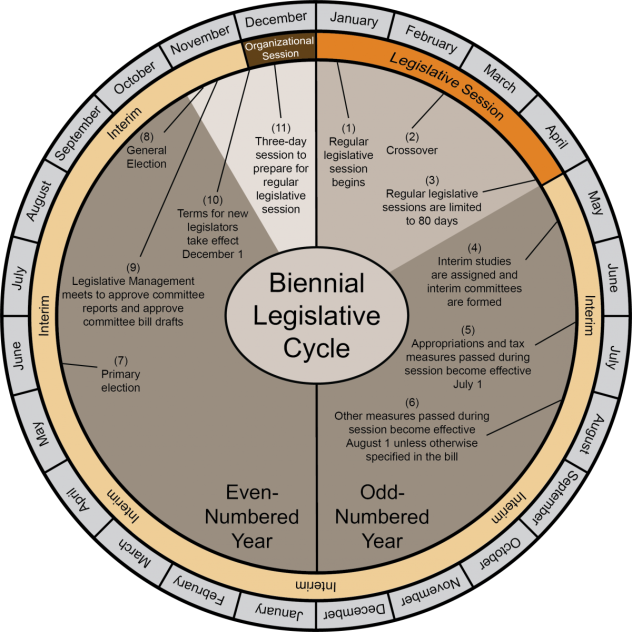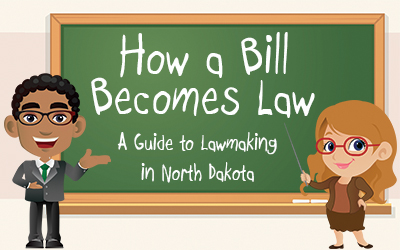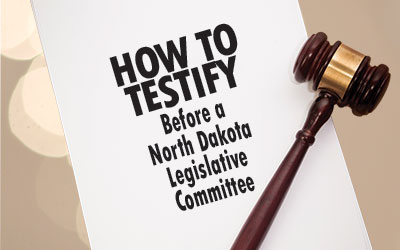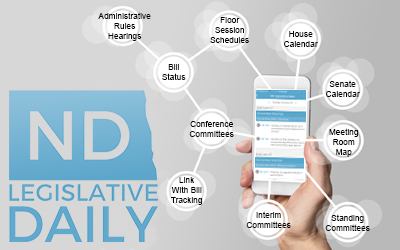Originally created by the 1945 Legislative Assembly as the Legislative Research Committee, the name was changed to the Legislative Council in 1969. Effective August 1, 2009, the Legislative Council became the Legislative Management. Its staff of attorneys, fiscal analysts, information technology, support, and library personnel retain the name Legislative Council. Today the 17-member Legislative Management by statute consists of 17 legislators, including the Majority and Minority Leaders of both houses and the Speaker of the House. The remaining six members from each chamber are appointed on a proportionate basis, with at least one of the of six appointed from each chamber from the minority party.
Following each legislative session, the newly appointed Legislative Management meets to determine upcoming interim studies and committee memberships. Each legislator serves on one or more interim committees in the two-year period between legislative sessions. Several interim committees and commissions, such as the Advisory Commission on Intergovernmental Relations, Administrative Rules, Commission on Alternatives to Incarceration, Budget Section, Employee Benefits Programs, Energy Development and Transmission, Higher Education Funding, Information Technology, Legislative Audit and Fiscal Review, Legislative Ethics, Tribal and State Relations, Water Topics Overview, and Workers' Compensation Review, function under statutory authority. Other interim committees are named and assigned by the Legislative Management members. Between sessions, interim committees hold hearings, take testimony, and review information provided by the Legislative Council, state agencies, and interested parties as they consider alternative approaches to issues raised by studies. As the need arises, the Chairman of the Legislative Management can assign additional studies during the interim. Occasionally, it is necessary for the Legislative Management to contract with universities, consulting firms, or outside professionals on specialized studies and projects. However, the vast majority of studies are handled entirely by the Legislative Council staff.
In November of each even-numbered year, the Legislative Management meets to consider the results of all committee work and may accept, reject, or amend committee reports. The Legislative Management then presents its recommendations, together with bills and resolutions necessary for implementation, to the North Dakota Legislative Assembly. The Legislative Management is, in a sense, the Legislative Assembly working between sessions.
Providing continuity between legislative sessions, Legislative Management through its attorneys, accountants, and other personnel known as the Legislative Council provides a wide range of services to legislators, other state agencies, and the public, including:
- Staffing interim study committees.
- Drafting bills and resolutions.
- Supervising the publication of the "Laws of North Dakota" (Session Laws), the "North Dakota Century Code," and the "North Dakota Administrative Code."
- Providing legal advice on legislative matters to legislators and legislative committees.
- Considering problems of statewide significance that surface during the interim.
- Handling financial administration for the legislative branch.
- Developing and managing information technology services for the Legislative Assembly.
- Reviewing information technology in all three branches of state government.
- Representing the Legislative Assembly at interstate organizations, such as the National Conference of State Legislatures, Midwestern Legislative Conference, Council of State Governments, and the National Conference of Commissioners on Uniform State Laws.
- Encouraging coordination between the Legislative Assembly and other branches of state government.
- Responding to informational needs of legislators and their constituents.
- Handling miscellaneous interim business for the Legislative Assembly.
- Maintaining a library of contemporary and historical legislative reference sources.
- Preparing and submitting to the Secretary of State the estimated fiscal impact of an initiated measure, then tracking and reporting on actual fiscal impact if voters approve the initiated measure.
In the area of governmental finance, the Legislative Management employs the Legislative Budget Analyst and Auditor who, with the assistance of a fiscal staff, provides technical expertise to budget and appropriation committees, reviews audit reports for the Legislative Audit and Fiscal Review Committee (LAFRC), and assists in conducting LAFRC studies designed to improve the state's fiscal practices.
Nearly every facet of state government has been influenced by one or more of the Legislative Management's interim studies over the past 64 years. Statutory revisions; government reorganization; development of coal, oil, and gas resources; school finance; tax structure; higher education; court unification; gaming; intergovernmental cooperation; administrative rules; human services; waste management; elections; reapportionment; Indian affairs; economic development; and information technology and telecommunications are among the numerous areas impacted by interim studies.
Perhaps of most value to citizen legislators are interim committees that allow members to keep up with rapidly changing developments in complex fields. For instance, the Budget Section receives the Governor's executive budget just prior to each legislative session, and the Administrative Rules Committee monitors executive branch rules.
The 1995 Legislative Assembly gave the Legislative Management authority to reconvene the Legislative Assembly. A reconvened session cannot exceed the number of days available (80 natural days) but not used by the last regular legislative session.
Legislative Management Final Reports
Legislative Management Committees




